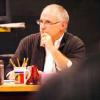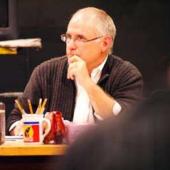I never imagined that the idea of establishing a Shakespeare festival somewhere in Minnesota would actually become real. Rather, it seemed a great excuse to get together every now and then with two friends and do a little “what-iffing.” I assumed that ten years or so hence, we’d meet up again in some bar somewhere for a little ironic, remember-when-we-were-going-to-start-that-theater reminiscing.
The idea was hatched when Mark Hauck, Alec Wild, and I ended up in the same place at the same time. In spring, 2002, Alec and I were directing Shakespeare projects at the University of Minnesota/Guthrie Theatre BFA actor training program where Mark, an already accomplished designer, was dusting off and completing his previously-suspended-on-a-shelf-somewhere MFA in scene design.
Alec and I had never met, but as we got acquainted, traipsing back and forth from our apartments to the University and the Guthrie Lab where the projects played in rep over a weekend in April — and experiencing our first real Minnesota winter — we discovered a common love of Shakespeare and, I admit, a shared disdain for a lot of what passes for text-dedicated productions of Shakespeare’s plays at theaters and festivals around the country. No shrinking violets, we — at least not with good Scotch in hand.
Still, the whole thing was Mark’s idea. He’s a Minnesota native, familiar with the theater scene, and a persuasive dreamer who managed to convince me over dinner during a late-April, six-inch snow fall (“Unnatural!” I thought, “Get me back to the other side of the Continental Divide!”) that this was a dream worth pursuing.
So, with Alec, we did. And, by the time we reconvened at my home in Ashland, Oregon later that summer to talk seriously about starting a theatre, news of our dream had spread down river. Lo and behold, the sleepy-seeming town of Winona saw the establishment of a summer Shakespeare festival as a component of the city’s plans for economic redevelopment. Thus, we were invited to visit — and after a couple of meetings with the city’s movers and shakers, they began a full court press to woo us: emails, missives, invitations for return visits, and, most significant of all, a pledge to provide start-up funding.
Basically, Winona, MN embraced us with, if not a full-on body hug, than an appropriately Minnesotan warm two-fisted handshake and shoulder squeeze.
Two months later, in October, 2002, we said “YES.”
Winona's class reality
From the get-go, the question we encountered most frequently was, “What makes you think Shakespeare can work in Winona?” In spite of its academic underpinnings (two universities and a technical college), Winona is known as a down-and-dirty, blue-collar, working class river town with a very colorful history. (Largest operating brothel during WWII. Right on the Mississippi River train tracks. Think about it.) But at the turn-of-the-century before the most recent turn-of-the-century, Winona was one of the five wealthiest cities in the United States, thanks to the timber and milling industry. Along with wealth came culture. Winona has the 2nd largest collection of restored Victorian architecture in the state; a vibrant stained glass industry; buildings now on the National Historic Register, and an abiding interest in the performing arts. It’s not just recreation on the River, pub culture, and wet tee-shirt contests; there’s a lot of vital artistic endeavor happening here.
Our answer to that frequently asked question was simple: People still like gathering together in darkened spaces to hear a great story, and these are some pretty great stories. (I’m convinced that somewhere in Huckleberry Finn, Huck counters Jim’s reluctance to see a performance by the traveling players by saying, “Shakespeare wrote for the people. We’re the people. Let’s listen,” although I’ve yet been unable to verify the quote.) But even at the universities, people were skeptical. In fact, there were arts supporters all over town who needed convincing as well. It took opening our first season, A Midsummer Night’s Dream and The Winter’s Tale (something familiar, something unknown; something safe, something risky), to convert the skeptics into believers.
A very fast six years later, we're about to open our 2009 productions of The Tempest and Love's Labour's Lost. In addition to a lot of financial support from the city, its businesses, corporations, and very willing citizens. we have received a lot of encouragement: a $10,000 grant from the NEA (on our first submission, no less), steadily increasing attendance (even last year when we took what many respected colleagues told me was the suicidal risk of pairing The Taming of the Shrew and The Merchant of Venice as our fifth anniversary productions), positive press, and a loyal following.
We also benefit from a company whose composition changes each season but features a central core of actors, designers, directors, and technicians who mostly love working together and who are passionate about Shakespeare – and Winona.
I’ve come to identify something I think of as “The Winona Syndrome,” which many of us experience upon our return each summer when we’re walking downtown again, getting our car serviced at Gordy’s or Gimore Avenue Lube, or — as happened to me just last night when I was replenishing the laundry detergent — at a local supermarket. It’s a shout out, often from a passing truck, an effusive greeting from someone who looks familiar — volunteers, playgoers — but whose name I can’t quite remember, who lets us know in no uncertain terms that we’ve made a difference in their lives. We matter. We are one of the reasons, as a matter of fact, that so many local residents now stay in town for the month of July instead of going somewhere on vacation, so that they don’t miss a moment of all the Festival has to offer.
A place for "pilgrimage"
With the establishment of GRSF, the advent and recent expansion of Winona's Minnesota Marine Art Museum, the arrival of the Minnesota Beethoven Festival, and the growth of the annual Frozen River Film Festival, we clearly boarded the right train at the right moment. Now, in addition to the area’s numerous outdoor recreation opportunities, people come to Winona for theatre, music, and art – for the reflection and renewal that a festival provides, and for the spiritual rewards of “pilgrimage” that are the core of all successful summer festivals. Long-time residents tell me that this is a more vibrant place to live thanks to GRSF, and an even better place to raise their families.
We, in turn, work hard to connect with our host community through any number of education and outreach programs, through the amount of business we do locally, as well as by being friendly, accessible folk who do our best to respect and not condescend to the town that is such a generous, appreciative host. (One of my most acute lessons was watching our Friday and Saturday evening Prelude Concert crowds increase exponentially when we began hosting local musicians, such as home-town favorite Simone Perrin. Winonans don’t need to be told who they should like.)
Of course, we've got our challenges. As with any new company, leadership has changed. Mark has moved on (though his legacy -- his ingeniously designed contemporary “Wooden O” unit set – remains). Funding is as tight as it is everywhere else. We're a nomadic bunch, scattering to the winds at the end of each season while a tiny year-round staff maintains the home base operation. Plus, it's a short season (5 weeks), so word of mouth must be wildfire-fast in order to effect attendance.
Still something about Shakespeare in Winona seems to be working more than well enough for us to soldier on, regrouping here on the banks of the Mississippi River each May to grapple with this unexpected – but happy! -- surprise all over again.❦
Paul Barnes
Paul Barnes is the Producing Director of Great River Shakespeare Festival and a freelance director who makes his home in Ashland, Oregon. Regional directing credits include productions at the Folger Theatre, Denver Center Theatre Company, the Alley Theatre, Repertory Theatre of St. Louis, Pioneer Theatre Company, Indiana Rep, Milwaukee Rep, Kansas City Rep, the Commonweal Theatre, American Players Theatre, and the Oregon, Alabama, California, Idaho, Orlando, and Utah Shakespeare Festivals.




